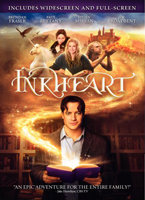Inkheart
Reviewed by Lynn Maudlin
[This review originally appeared in Mythprint 47:5 (#334) in May 2010.]
I did not know the source material, the German novel Inkheart by Cornelia Funke, but I wandered into the DVD store and saw this movie with a fantasy cover, I noted the fine cast and I figured it would be worth viewing – and it is, very much so. In a nutshell, Mortimer (Mo for short, played by Brendan Fraser) has the gift of a ‘silver tongue’: when he reads out loud, characters come to life and leave the world of their creation to enter ours. The dark secret is that something from this world must leave to replace it – sort of a fictional version of the law of the conservation of energy.
After a brief glimpse of Mo, his wife and daughter as a toddler, we are brought into the present: Mo specializes in the repair of rare books and his now teen-aged daughter Meggie (Eliza Bennett) has observed that he’s always looking for a particular book and is always disappointed when he doesn’t find it. While Mo is searching an old bookshop, Meggie meets a strange man with a ferret and a scarred face who seems to know her; he calls Mo “Silver Tongue.” They flee from the man and Mo indicates it has something to do with Meggie’s missing mother – it’s mysterious because Mo wants to protect his daughter from something but we don’t know what. The two drive across the Alps to the home of Mo’s Aunt Elinor, played by the always-fabulous Helen Mirren.
She enters the scene with the engaging exclamation, “For the love of Thomas Hardy!” She is crotchety and rich and lives in an Italian villa complete with a fabulous library. Elinor, outspoken and insensitive, tells Meggie she was abandoned by her mother. Later Meggie enters the library without permission; she first alienates and then engages Elinor: she learns Elinor loves all things Persian and asks if Elinor has been to Persia. She answers, “Yes, a hundred times. Along with St Petersburg, Paris, Middle-earth, distant planets and Shangri-la – and I never had to leave this room. Books are adventure; they contain murder and mayhem and passion. They love anyone who opens them.” What reader doesn’t relate?! *Bliss*
The scarred man, Dustfinger, reappears and we meet more characters from the illusive book and learn its name: Inkheart. Some of the men have words printed across their faces: they’ve been ‘read out’ of the book but imperfectly, incompletely. Mo, Meggie, and Elinor are kidnapped and Elinor’s library ransacked by “solecistic thugs.” It is in the dungeon of the villain, Capricorn – a stable, really, containing the ticking crocodile from Peter Pan, flying monkeys from The Wizard of Oz, and more curiosities – that we hear the story that Meggie has been waiting her whole life to hear: how her mother disappeared, how Mo bought a copy of Inkheart and innocently read from it, drawing Capricorn and Dustfinger and other characters out of the book while his wife disappeared into the book.
Meggie is understandably horrified to think of her mother living all these years in the rough fantasy world of Inkheart and her father, trying to comfort her, says, “Pretend you’re in a book; children always escape in books.” Meggie sensibly responds, “No they don’t. Remember the little match girl? They found her in an alley, frozen to death.”
We learn Dustfinger has also been desperately looking for a copy of Inkheart because he wants to be read back into the book to reunite with his family. Brought into Capricorn’s great room, Mo reads under duress, bringing forth treasure from Tales of the Arabian Nights, along with young Farid. When Capricorn discovers Mo has at last found a copy of Inkheart, he takes it and burns it – he has no desire to be sent back to the novel and has sought-out and destroyed copies of the book for years now. Back in the stable-dungeon, they befriend the confused young Farid and Mo is tempted to despair but Meggie reasonably points out that if the author of the book is still living he must have a copy of it – if they can only escape.
All of this is further complicated when Dustfinger discovers the mute woman working in Capricorn’s kitchen is, in fact, Resa, Mo’s wife and Meggie’s mother, lacking the ability to speak because she was imperfectly read back out of Inkheart by Capricorn’s stuttering silver tongue. Dustfinger is determined to free her and reunite her with her family but ultimately leaves her behind in an act of fearful self-interest when the growing troupe escapes to find Signor Fenoglio (Jim Broadbent), the man who wrote the book.
In a wonderful confrontation with the author, Dustfinger says, “Do you think I care what you wrote? You don’t control my fate. Otherwise I wouldn’t be here. I’m not just some character in your book … and you … you’re not my god.” This is the real, thoughtful core of Inkheart and it deals with the questions of freewill and what does control our fate: is Dustfinger bound to be only a coward, selfish and weak, because he was written that way? Or is he more? Even ‘the real world’ characters challenge their limitations in the struggle to be more.
It’s a lovely film, well acted and beautifully made, and a story with entertaining twists and turns and humor, but, best of all, it leads one to consider essential questions of courage, character, and identity.

